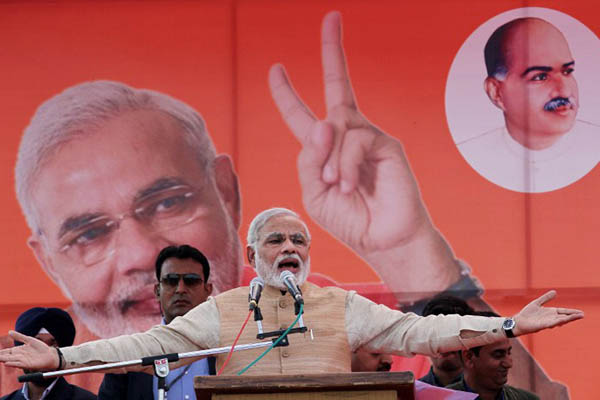Indian opposition leader claims he will follow the path of former premier Atal Vajpayee, who signed ceasefire with Pakistan in 2003.
India’s opposition leader Narendra Modi sought to allay fears Wednesday about his communal credentials, pledging harmony during an election rally in the country’s only Muslim-majority state of Jammu and Kashmir.
Hindu nationalist hardliner Modi said he would promote democracy and equality if he came to power at elections starting next month, during his first rally in the troubled region since polls were announced. “We will follow humanity, democracy and Kashmiriness … the path shown by Vajpayee,” Modi told a gathering of thousands in the Jammu town of Hiranagar close to the disputed border with Pakistan.
Modi, the prime ministerial candidate for the Bharatiya Janata Party (BJP), was referring to former premier Atal Bihari Vajpayee who signed a ceasefire agreement with Pakistan along their de factor border in 2003.
Modi accused Pakistan of spreading “cross-border terrorism” in Indian-administered Kashmir, but did not mention any retaliatory measures if he was elected, instead focusing on peace. “Equality and democracy is the answer to all the problems,” Modi said as he asked voters to “trust” him in a state that sends six M.P.s to the national parliament in New Delhi.
Modi, a popular but divisive figure, is tipped to oust the ruling Congress party with the BJP expected to win the most seats at the elections starting on April 7 and running in nine phases until mid-May. Modi, the chief minister of western Gujarat state, is campaigning on a platform of reviving the nation’s faltering economy and creating jobs.
But many Muslims oppose Modi who is accused of failing to do enough as chief minister to stop riots in 2002 in Gujarat that left more than 1,000 people, mostly Muslims, dead. Modi denies the allegations.
During his speech, Modi promised full rights to those displaced from west Pakistan during Partition and the subsequent wars of 1947 and 1965 between the two countries. More than 100,000 displaced who are living in Indian-administered Kashmir have no citizenship or voting rights.

